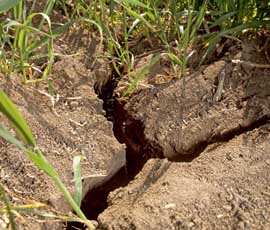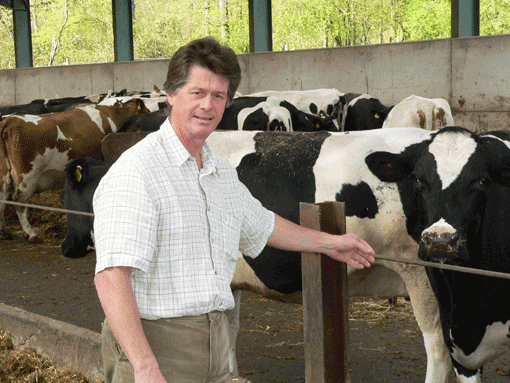Rain needed after ‘driest 12 months on record’

Livestock and crops may suffer if the dry weather continues this winter and soil moisture and reservoir levels do not refill, the NFU has warned.
From October 2010 to September, parts of the UK, including the Midlands, southern and eastern regions have seen the driest 12 months on record, according to the NFU. By contrast, Scotland has suffered its wettest summer for 60 years.
The pattern of dry weather has continued in November and heavy rainfall is now needed in the driest areas, such as Shropshire, said Jenny Bashford, NFU water policy adviser.
“We need about a fortnight’s rain, both day and night, in order to restore groundwater levels to normal,” said Ms Bashford.
“We have had quite good crop establishment this autumn. However, if we carry on getting minimal amounts of rain, the grains won’t fill and you then start getting into the problems of water resources.”
A water resource problem is likely if reservoir and soil moisture levels do not replenish this winter, she added.
Fodder fears
“Once you are into a water resources problem, you then could have the effects of a shortage of water for livestock as well as for crop grain growth,” said Ms Bashford.
Grass production in England and Wales could fall if cold weather follows a dry winter this spring, she added.
“If it turns very cold this winter, we could have a shortage of fodder for livestock.
“Then if we have a dry spring and we don’t get the grass growth, you are not going to get the early silage cut for your dairy cows.”
Rising water costs
Speaking at the launch of the NFU water survey for 2011 in London on Thursday (17 November) Ms Bashford warned it was likely water costs were going to rise because of population growth.
Agriculture in the UK uses only 1% of the water abstracted in England and Wales, according to the report. About 71% of farmers who responded to the survey use mains water from the public water supply.
Sixteen per cent said they had access to a reservoir and 18% said they irrigated crops, the survey showed.
Around 55% have time limits on their water abstraction licenses which are required for use above 20 cu m (700 cubic feet) a day, “which means under certain conditions they will not be allowed to abstract water”, the report found.
The survey showed that over 50% of agricultural abstraction licences were time limited and Ms Bashford urged the Environment Agency to increase their flexibility for farmers.
Some farmers were investing hundreds of thousands of pounds in some cases in their own infrastructure and they were only getting limited public funding with investment – just 7%, according to the survey.
Ms Bashford said farmers were not building more reservoirs because of the uncertainty of getting access to the water rights and planning permission.
Water reuse
NFU vice president Gwyn Jones runs a 300-head dairy farm in West Sussex. He said his cows drink about 3,000 gallons of water a day and he is recycling water.
“The cost of water itself makes sure these days you are as efficient as you can be, that you don’t have any leaky pipes,” said Mr Jones.
“The water we use for cooling the milk is then given to the cows. It’s a case of trying to use water once, twice, three times if you can.”
 |
|---|
NFU vice president Gwyn Jones said he tries to recycle as much water as possible on his 300-head dairy farm. |
Call for action
The NFU is calling on the government and its agencies to help farmers improve their water efficiency to boost food production.
The union would like to see:-
• Government and agency support for the use of voluntary abstraction restrictions and abstraction management in catchments and times of low water availability as an option enforced by farmer abstractor groups
• A transparent, consistent but flexible delivery approach by the Environment Agency in relation to the regulation of abstraction licences
• A restoration of the threshold for the ‘large’ category of reservoir to be defined as 25,000 cu m to encourage building of more farm storage reservoirs
• More research and development into drought-tolerant plant varieties and on-farm demonstrations of new, more efficient irrigation technologies
• Investment incentives, such as appropriate exemptions, tax incentives and grants to encourage the use of water efficient irrigation technology, such as drip and computerised irrigation systems
• Water companies to have and abide by a Code of Practice when drawing up drought orders

